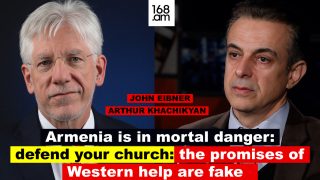Elections are over…forget about them
The “Pressing” Club re-launches its debates under “168 Hours” newspaper. In this pre-election period our purpose is contributing to conscious election of voters through debates with the participation of political powers, economic, political and social figures, as well as experts. The project is implemented in partnership with “DEPOP” Institute for Governance and “AZAD Pharma AG” ltd.
The discussion was conducted by Tigran Hakobyan, member of National Commission of Armenian Public Television and Radio, PR and media specialist, political scientist, publicist.
Week’s topic was: what issues will the future government, Armenia and the Armenian community face despite election results?
Participants of the debate are: Aghasi Tadevosyan, social and cultural anthropologist, Aram Mehrabyan, Director at Printinfo Publishing House, Director of Dilijan Central School (DCS), Spartak Seyranyan, politician, member of ARF (Dashnaktsutyun) Supreme Body, Vahagn Vardanyan, representative of the Chamber of Commerce and Industry of the Republic of Armenia in Singapore, Malaysia and Indonesia, international relations expert, Levon Margaryan, political commentator.
Tigran Hakobyan: Electoral advertising of these elections in no way differs from an advertisement of any product, the same ketchup, i.e. buy me, my programs are good, I have 50 years of experience in the market, you’ll enjoy my taste…However, elections will be over after some time and despite the fact which political power or alliances will form Armenia’s system of governance, they won’t change issues, which Armenia faces. And the power coming to leadership, should attempt to solve these issues based on its political views or ideologies. Forgetting about these elections let’s attempt to imagine the Armenia of tomorrow—post-election Armenia, when euphoria of the political parties is over and there comes “hangover”, after which one starts thinking: how should I live?
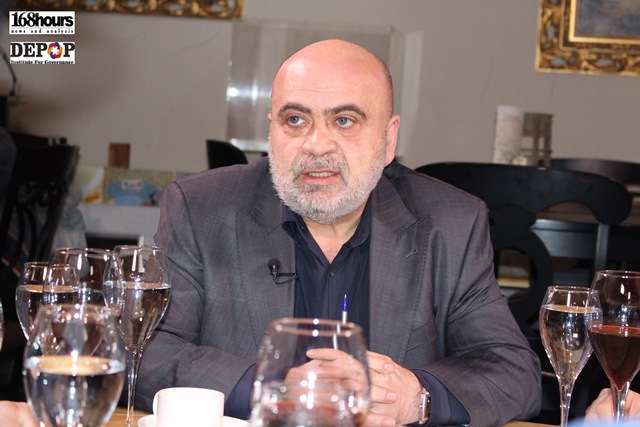
My first question to Vahagn Vardanyan—we always speak of the European vector as our choice, and we build our future plans based on European system of values (democracy, free market and, the so-called European values). As you have experience of working in Asian countries known as “Asian tiger” and reached impressive success throughout recent decades, what do you think, how productive will it be for Armenia to pay attention, for instance, to the experience of Singapore, Malaysia, Hong Kong or South Korea in choosing its future development models.
Vahagn Vardanyan: Of course, what we discuss, what takes place; everything should be taken into consideration within the context. If one takes a fragment and uses it in a different place, in this case, if you say Singapore’s example in Armenia’s reality, of course it’s impossible to identically implement it. Of course, one can’t identically copy from the perspective of historically developed environment of people or population, geographical position, many issues. In any case, we should clarify two points for us, first, what kind of a development do we want? If we conditionally look 20-30 years further, how do we imagine Armenia’s being developed? Of course, it doesn’t mean if in very Singapore or Hong Kong specific gravity of skyscrapers in Hong Kong is high and etc., it means…Iceland is also a developed country, where there are no buildings higher than 3 floors. Thus, everything is within the context.
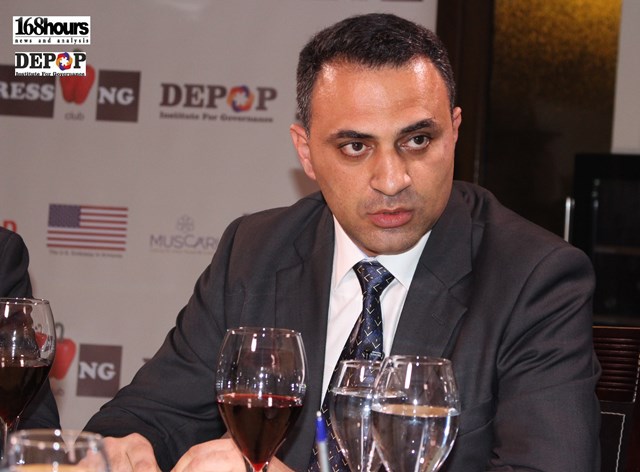
The second condition, we should be able to learn from the experience, success of other countries, and of course, failures and be more pragmatic, as it’s my deep belief we are a bit naïve nation. Firstly, in the sense that in many issues we didn’t entirely learn from pure experience or our history. And secondly, we may afford such naivetés, like , e.g. this person or this country is our friend, or treats Armenians well, and this one is against Armenian—these things, of course, lack.
Within international relations there are only interests, and of course, it’ll be a big mistake looking to the issue otherwise. Now, that we take Singapore’s example, which is widely touched upon especially throughout recent years, of course, creation of everything didn’t happen in a day, but one of the crucial circumstances was political stability, predominance. And there are certain preconditions, which have contributed to that. I mean fight against corruption. Of course, where there is a person, there is corruption, one can’t say than in a country corruption, even if we take top five or six, where Scandinavian countries are found—Singapore, New Zealand, i.e. in those countries one can’t say that there is no corruption, but primary is fight against corruption by the state, and this is the indicator.
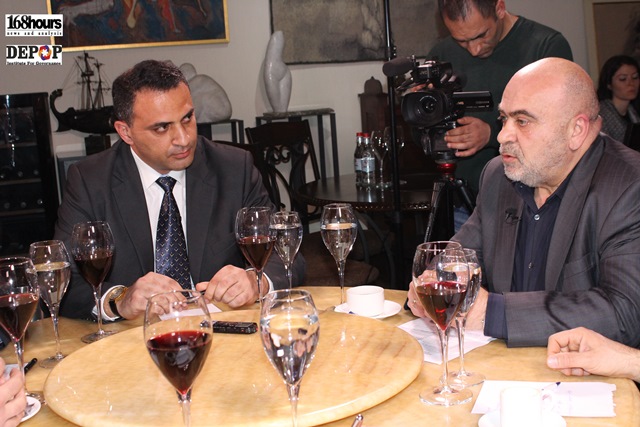
It’s impossible to fight against that phenomenon only by adopting an impressive law— it should be implemented through work with people at an early age—from school, kindergarten. Let’s observe Singapore’s example: 6 year-old child goes to school, studies for 12 years, and then, if a male, serves in the army, and then studies in the University, and everywhere in that entire educational system he sees what a bad thing is corruption: it doesn’t matter whether promotion of that idea will be through textbooks, posters or through teachers—from the age of 6 the idea is being developed and fixed that it’s a bad phenomenon.
Provision of productivity in the country is conditioned by that, of course, the entire civil service system is based on it. Many things from Singapore’s experience can’t be identically applied, as differences in our mentalities are great. Three main nations live in Singapore, but most of them are Chinese. In any case, if we take that snapshot, it’s the methods of civil service that can be installed here, and of course, fight against corruption.
Let me introduce an episode to imagine how highly the institute of fight against corruption is assessed in the country. It’s a noteworthy fact: 2 years ago, when Lee Kuan Yew, Singapore’s founder and the PM, died, the motorcade, which was to move from the parliament building to the place, where the ceremony was to be held, was planned in a way that the route passed the buildings expressing Singapore’s crucial achievements, in which the administration on fight against corruption has particularly stressed.
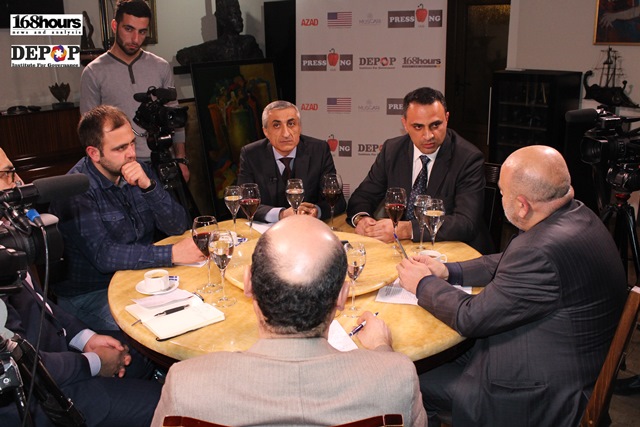
Tigran Hakobyan: My question to Aram Mehrabyan and Aghasi Tadevosyan: the human capital we have in Armenia, and quality of that human capital is mostly expressed during the pre-election meetings…people have lost their independence, capability to independently deciding their future, these paternalistic moods, existing in Armenia today, i.e. they are waiting for a savior, a successful person, who will come and solve their issues. Under this human capital conditions can the mentioned fight against corruption have success if we have not teachers, who would teach children to hate corruption, love homeland, independently reach their goals?
Changes may be recorded in the countries, where a common vision for the future unites people. I don’t speak of the ruling elite, as it’s a changeable category, the in-depth nation itself, which isn’t united through that common vision, as all the points consolidating us are in the past, let it be Genocide, Greater Armenia, Big Armenia…Can people with no future vision, with such human capital, implement reforms in Armenia and what should they start with, if we don’t have those grounds?
Aram Mehrabyan: Nature of your questions is wider, I wouldn’t like to focus on corruption, as I suppose corruption is an after-effect. There is an eternal issue of the good and the evil, of correct and incorrect—this is an eternal issue among both the state and the society. However, as we live in an era, where we deal with floating truths, it’s very difficult to orientate, where the truth, freedom, creativity is born and an environment of widespread confusion is established. Vahagn spoke of our naivety—I don’t so negatively refer to naivety, I’m mostly bothered with primitivism.
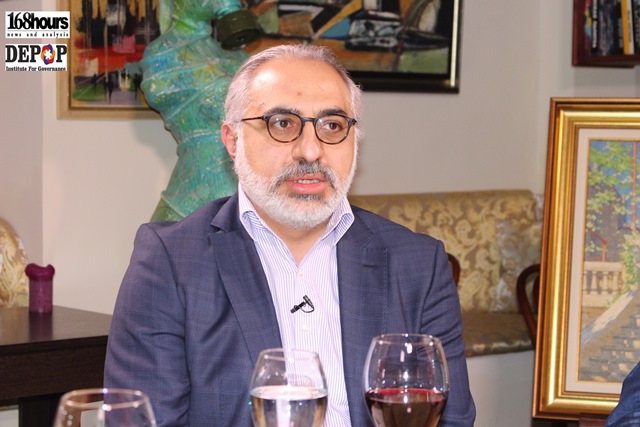
I observe the tendency of primitivism, and, first and foremost, it’s linked to the speech, to the word. I have the impression that the word has no influence any more—the word has lost its magic. Word and work are closely interrelated, i.e. people should get inspired by the word, at least urging to direct to work. This is a bothering fact. That’s why symbols of magic sticks, miracles come, which generate the requirement for contrastive phenomenon, i.e. any activity, by which you’ll earn the right to use that word.
As we are a nation developing talks, and hopefully, our today’s debate will be collective, and not a monologue of 6 people, and in-depth issues, which will be raised, at least seek for the answer will be creative and our dialogues will be creative.
Tigran Hakobyan: But those creative dialogues will again remain within the so-called cultural elite. I speak of the people: if the word has no value, by what that wider mass of Armenia’s citizens may get enthusiastic, which should be the one indicating that guideline, who should be the authority to change mentality of the people, as the Armenian citizen needs radical change.
Aram Mehrabyan: Anyone, let him be a teacher, a businessman, a commentator, if he/she has gained the right to speech by work, then he/she has the right to speak. We see people speak, who didn’t gain that right. If devaluation of speech is taking place, a bigger implication—de-humanization is taking place, what we clashed with regarding, e.g. previous year’s escalations [“Sasna Tsrer” armed group – ed.].
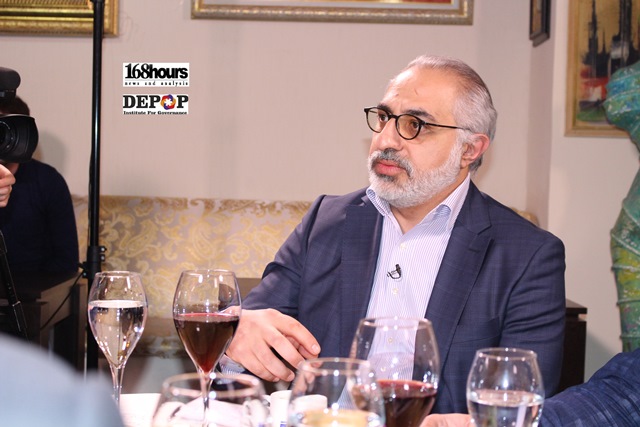
For instance, investments are recorded in the field of healthcare, buildings are being constructed, but the man won’t change—this is the bothering point. What should we do that a person changed his/her imaginations, and remained loyal to his/her title. One of the possible variants is development of a new person, which takes place in kindergarten, school. Frankly speaking, the junction of all vicious phenomena in our society leads to education. And education is not only the monopoly of schools or educational institutions…TV, street, word stock of political figures, views…There is such a burden on the teacher to educate, and there is anti-education, which comes from the TV. What happens on TV tends to simplification of the language. When the language, the word loses its depth, a person becomes primitive. A primitive person isn’t capable neater of working, nor creating, moreover, dreaming.
Tigran Hakobyan: You said, that a person should earn that right, to address some messages, but persons in our political field, who apply to people in this pre-election period, upon public imagination, they all reached success and have gained that right with their mansions, their wealth, which is one of success criteria. They are primitive in their speech, but according to the citizens, they are people, who reached success. How should that discourse be changed? How should people be explained that primitivism isn’t a pledge for success and who should give that education to people? Who should bring up the younger generation, when metastasis of speech devaluation, primitivism, bribery have penetrated into teachers’ stuff? Who should tech those dozens of thousands of children, who need it?
Aghasi Tadevosyan: There is an interesting expression in cultural anthropology—politics is continuation of meanings in people’s life. The author expresses that interesting idea while analyzing political developments in Indonesia, when he sees what different groupings are available, from religious to cultural, as Indonesia is miscellaneous, and he comes to the conclusion, that the way out is in the point that meanings on political arena should create reconciliation activities and mega-senses, through which small senses existent in different social groups, can be commented.
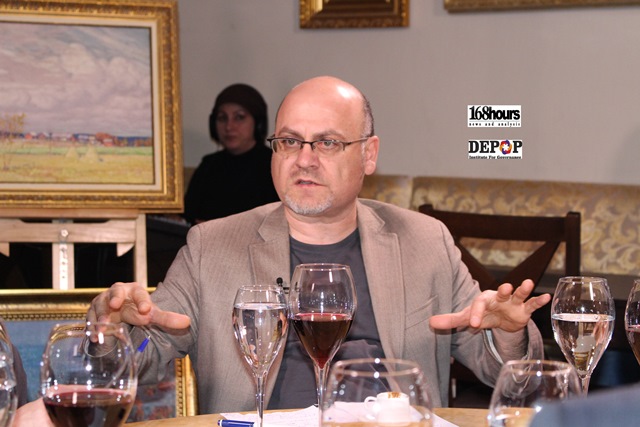
When I follow present-day political situation, I see that our politics today is subjectivity of those meanings in politics in form of actions. People stab one another, and etc., I consider them subjection of existent meanings among our society. Currently I implement survey among teenagers, and it turns out that it’s mandatory for under-age boys to have a knife on (formerly it was also so, but currently that phenomenon has intensified). And keeping the knife isn’t just for keeping, there is certain meaningful practice, in case of which they’ll use it. When you look from the perspective of social life, they are awful senses and practice, but it exists.
Besides these small senses in some sense there are big meanings, which come from what you said, i.e. how success is conceived: in our society success gains meaning on family level, from social circles, and until now we don’t observe success on state level to say we should consider success of the state as achievements. Those ties—individual and social, big social circles, we haven’t yet developed such meanings. We have no numerous such meanings. For instance, progress as a crucial sense, we haven’t it in our life, we simply have no the idea of progress in us. If we don’t have it, if there are no groups living with the concept of progress, we can’t become a developed state.
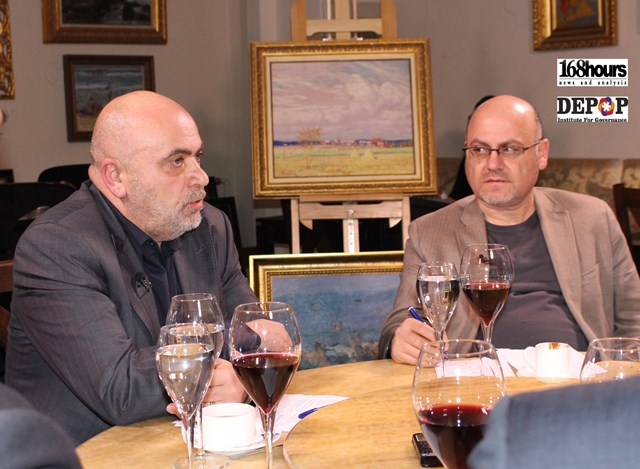
If we speak of Europe, Singapore, people have lived with those ideas, voluminous books have been written covering those issues, debates have been launched. Now I don’t want to simply criticize our society for its absence, I consider its absence also natural at a certain historical stage, as it’s typical of post-Soviet societies, that they are deprived of formulating meanings. In the period of 70 years one of the purposes of that state was to deprive a person of developing an independent concept, as it was developed by that partisan elite. However, we currently face that imperative and in your question there is that in-depth sense: who should develop those meanings?
Firstly, let me say that I support the idea that I don’t see development, the model from the bottom, and I disagree with it, I don’t support it. Although there are two big development models: one of them is that development takes place from the bottom, i.e. people develop separately, individually, and it leads to development of elites. It’s an awfully slow process and lasts for a few centuries, in some sense we may consider Europe as its example, however, there is no such an example in the world. When Europe itself had such a development, as a result of the development of their aristocratic class, meanings have changed. Aristocracy in itself gave birth to meanings, contradicting to its dominance and it led to society change, those senses were transmitted to other layers of the society as well—freedom, equality and other concepts, mega-narratives, which caused changes among the society.
For instance, the very idea of progress came from the concept of rationalism and as a result of many other discourses such meanings were born among the elites. The second model is that groups appear in elites, which change, then generate new meanings and disseminate them in other social layers, which become its carrier, and those meanings give birth to practice, i.e. daily practice changes.
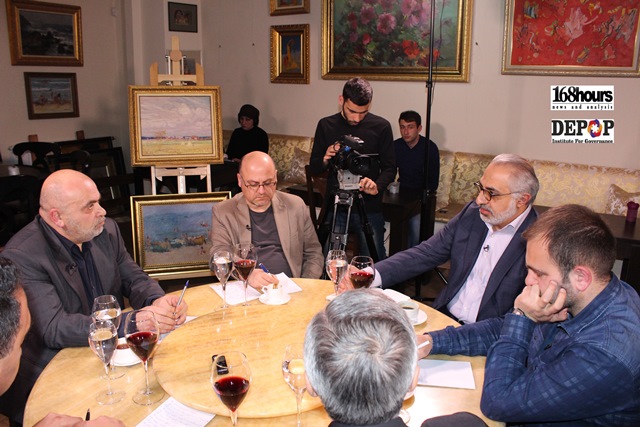
Tigran Hakobyan: Do you see that process or one day to wake up and see that the elite has developed and it urges rules for the game?
Aghasi Tadevosyan: I see, they are in our society, although on the level of individuals, separate shimmers. I don’t see yet those shimmers turn into a group, formation, I even don’t observe its process. I hope, current processes and this extremism among the society, that clan leadership, which already turns parliamentary political struggle into stabbing and this kind of extremism, and it seems to me, that this will lead to a lower point, beyond which the spring either breaks, or swings back.
It seems to me we came to the moment, that the spring will break and we’ll turn into desperate societies, not able to think over development and live under the umbrella of a different state. For instance, we’ll accept dominance of the Russian state and will consider, that Russia provides our security, and will provide the rest as well. As a result, we’ll have a few rich people, and this poor people, who have adaptive, creative good qualities, will migrate to the centers, where those qualities are required.
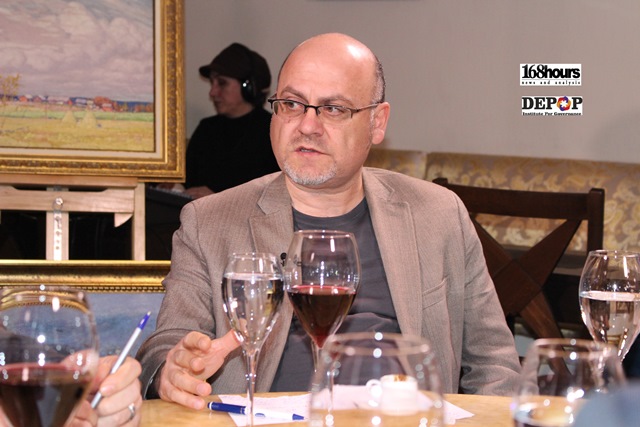
Now I can’t make guesses what’s anticipated to us, however, until now we seem to face that situation, and it’s difficult to say how this situation will develop. It may develop by a bad scenario as well, with some miracle it may go to consolidation of individuals developing sane meanings and by some miracle they may create an alternative link of leadership, that will start changing Armenia not to revolutionary hard way (I don’t support revolution, as the era, when revolution started to give results, is in the past), but an authority with qualitatively new type of mentality, that a group capable of developing new concepts was created.
If that pole is created in our country, it’s possible that existent so-called elite—people having money, tried to understand that they face the issue of coming across with that pole and should be able not to arrogantly mock at the society, as this all is mockery, but should attempt to find edges for coexistence with other layers. However, to face this issue, some pole should urge them. I don’t consider that based on claim, discontent hundred thousand people can do it. Even 10 or 5 people may do it, who clearly believe in the concepts they bear and are ready to eliminate those concepts, and disseminate among the society.
The society, people like meanings, a human is a living creature fed with a meaning, and if such exist, he/she will take those meanings and the balance in the society will change. If it isn’t recorded, we’ll simply appear in this region, under the influence of an influential state, in all likelihood, Russia, like we used to live for 70 years. Simply if in that period there was no strictly polarized society that time, currently we have it, considerable part of which will constantly live in poverty.
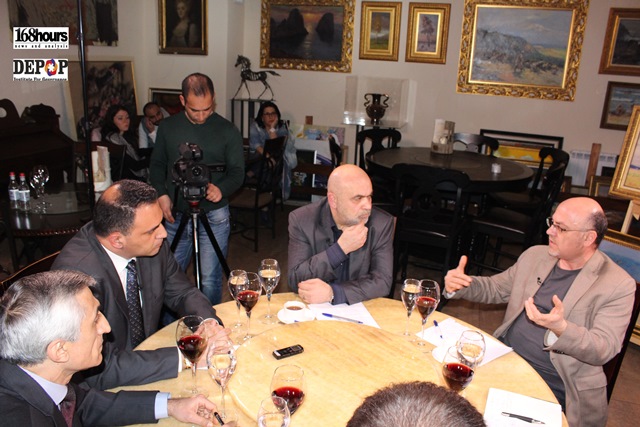
Tigran Hakobyan: Mr. Margaryan, development of the elite, expressing new concepts, is time-consuming. After two or three weeks new government should be formed, and despite the point whether there are new meanings or not, those new elites are developed or not, challenges that Armenia faces will exist or not, it should attempt to develop from today’s elite and develop those new concepts and get Armenia out of this situation. As you may see there are no new elites and all complain of the old elite.
Levon Margaryan: Title of discussed topic is already an indicator to fully understand the situation, if we attempt to forget what will happen after the elections, who will become the government, by that we actually accept that we realize the situation, we understand that basically there is no political competition, and that we only deal with mathematics of resources, and realize by plus-minus 10% what snapshot we are going to have in the future. And implications of these rather boring elections are also added to the list of issues any Armenian government will have in 2-3 weeks. And this issue is the new share of de-politicization, political non-participation, alienation of the public from politics, that we’ll have, even if formally, some weak opportunity, the society doesn’t have hopes to put itself in political fervor, and starts to involve in rather apathic processes, and we, as a result of the game rules set by this new Electoral Code and Constitution, will have a society, which basically has nothing to do with politics.
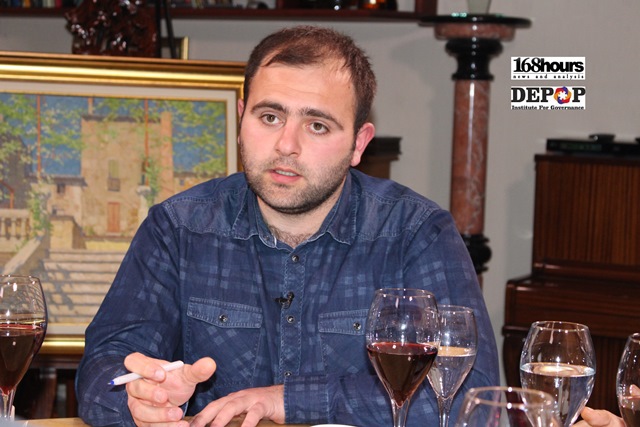
At the moment in Armenia 20-30 people decide politics—people nominated by preferential voting system. And this political non-participation will bring a political depression, which may be differently expressed. That depression in Armenia is usually expressed in form of migration, our way of disobedience, protest for years has been migration, and we didn’t see that accumulation of social protest in some domestic policy, internal social processes.
What issues will Armenia’s government have in 2-3 weeks? When we say government, generally there is a perception among the public that, and the authorities with their propaganda attempted to do so that the authorities and the government were separated. When we say government we approximately understand something like Ministry of Social Security, which should only do financial and economic calculations, and political decisions were made, e.g. in the parliament, or mainly, in the President’s Office. Basically until 2018 we’ll yet have a system, where main political decisions will again be made in the President’s Office. And in this case, when we speak about the government only, we should speak of economic programs, however, to understand the situation well…
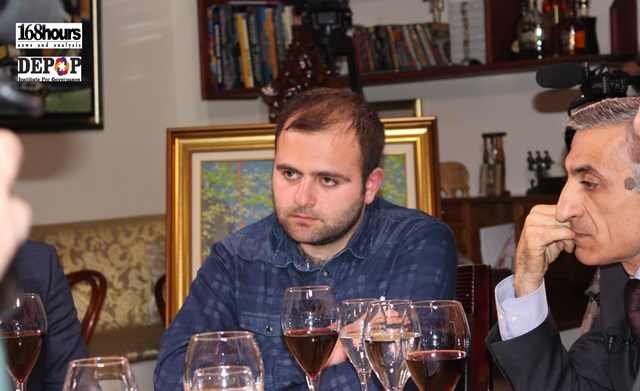
Tigran Hakobyan: I’d prefer we talked about the government as a leading system, state.
Levon Margaryan: The government, basically is in a system, where it doesn’t make decision of the moment, political decision are made in a different place. And the government simply attempts to provide a background through small economic changes. Main issues Armenia faces haven’t changed for 20-25 years, and the most important issue still remains Artsakh conflict. Already in domestic policy discourse that conflict exists after the April developments, it remains Armenia’s foreign policy crucial issue, also besides being an issue, it’s a toolset, by which we socialize with the world, i.e. in a concrete geopolitical region we are under the sign of Artsakh conflict, they position toward us and we position ourselves based on Artsakh conflict.
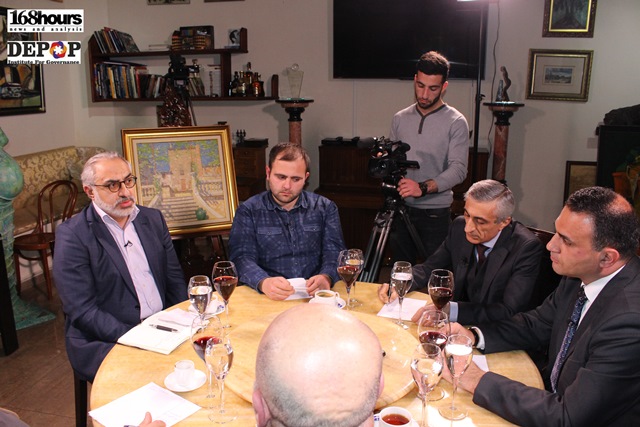
Especially now changes in the world—the USA, Europe, which have a tendency to continue, as they have been based on social changes, social structure and moods are changing, powers, which formerly were a minority, now they start to enlarge their administrative resources. We also observe changes in Russia attempting to review its role, attempts to find its civilization importance in the world…and all these processes lead to a satiation, that we should have a clear position. Coming to the issue why should any Armenian elite do it, it should currently attempt to understand the identity of Armenian society and our posture in this world. I don’t consider we are such a big state and we’ll have enough resources, even in case of best human resources, to be able to dictate some rules to the world. We’ll always have to attempt to position ourselves under these conditions of Armenia, attempt to find within a big civilization project. Here, of course, we may have some peculiar cultural narratives, however, at large, we’ll continue remaining a consumer state. In this sense, our ruling elite should attempt to possibly position itself comfortably.
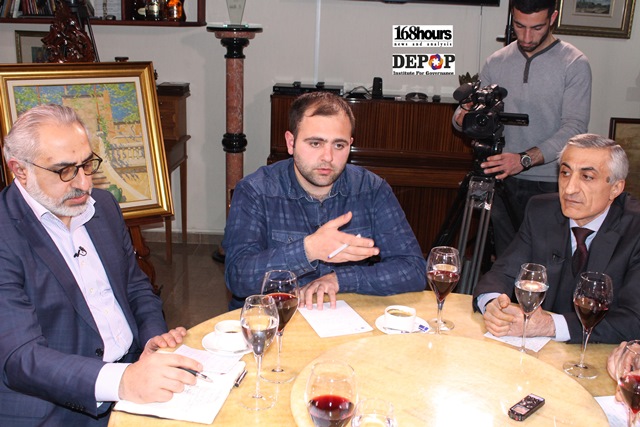
Tigran Hakobyan: What do you mean by saying positioning?
Levon Margaryan: Look what changes are currently taking place, who is coming to power: we see populists. The correct environment of politics, which, e.g. prevailed in the 2000s, currently lacks. Now a phase of political discourse is coming, when clear positions are necessary, spaces for maneuvering are becoming lesser, and Armenia, whether want or not, at a certain moment should express that posture. It can be foreign policy position, it may be civilization position, this or that development vision and etc. However, that clarity sooner or later will knock at our door, and we have to give that response. We see that we have a leadership, which for years worked by the principle of complementarism and attempted to always avoid that clarity, always maneuver, moreover, in most cases it succeeded, we’ve been able to reach something due to it until now or avoid something.
However, we don’t see our alternative in the opposition powers beyond the authorities. When we speak of elites, we seem to intend to separate themselves from political powers, as currently there is no such a positive attitude toward the political powers. However, answer to your question on finally who should do that, let me reply: the political powers. Of course, the political powers, which as we currently see, instead of programs appear with toasts and wishes, aren’t capable of doing it, as they don’t play politics, but mafia, they pursue clan interests. Even political powers, which have no large private property, at a certain moment acquired political capital and attempted to keep it, unite it. For instance, we see unions with no ideological ground, people attempt to keep that capital. We don’t see that alternative in opposition either and currently we attempt to alienate the issue from politics, however, I consider, the elite, which should inspire to those changes, attempt to touch that demand and give a proposal to it, it should be the political powers.
No matter how many will be the people doing intellectual job with self-sacrifice, there won’t be an opportunity to implement those changes until there is an institutional ground. And as these apolitical processes in our country are more deepening, rather negative attitude is being developed toward politics, political institutes, powers, political parties. Already in any discussion we feel that we use “political party”, remove the word “elite”, meanwhile elites should comprise political powers, they should assume the responsibility of taking a step.
Tigran Hakobyan: Mr. Seyranyan, Mr. Margaryan said primary issue is Artsakh. Let’s imagine a theoretical situation and we don’t have those external threats and challenges, we leave in peace, have good relations with Azerbaijan and Turkey. Does this mean that corruption will be eliminated with us, that we’ll become a competitive state, that there were corresponding educational, healthcare qualities, that we’ll really build a social state.
There are dozens of countries with no external threat and territorial disputes, e.g. Haiti or Somali, however, a disgraceful situation dominates there, and yet they are called states. There are two contradictory approaches—until Artsakh issue is settled we won’t reach anything, and second, Artsakh doesn’t hinder us to solve issues and provide progress, however it doesn’t provide. What should the government do that Artsakh issue was settled?
Spartak Seyranyan: The debate has rather correct questions to the sense what we should start with. We have neither lack of those expressing fresh ideas, nor those ideas suffer provincialism. The issue is as follows: seemingly there are clusters in our country, which should accumulate ideas, but there are no accumulation platforms of ideas. If we speak of political powers in a classical sense, let’s observe Europe: all political ideas have been initially manifested as cultural ideas, they were cultural codes (literary works, painting, music and etc.), then they rose by one degree to philosophical theories, then became political theories. It’s not only naivety to anticipate in Armenian reality that only political powers give new political product, but also it’s excluded, as it wasn’t recorded in the world.
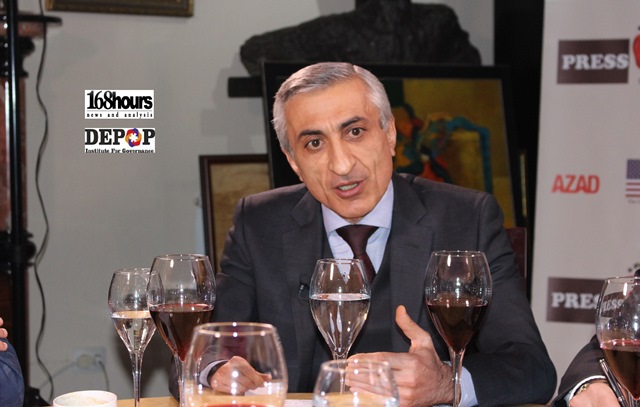
With our Armenian exclusiveness we shouldn’t entrap ourselves…A new idea can’t circulate among the political powers, if there are no producing social layers. Unfortunately, in our public the biggest deficit by such formats are fields for debates: debates and discussion of brain centers, from where interested political powers should gain new ideas and an agenda, which don’t relate to ideology of that political party, but issues that country, that system faces.
The issue in our country is that we have no answers, as we don’t formulate questions. Mathematicians are very correct saying: if you anticipate that I gave a true answer, then formulate your question correctly. In our country agendas, as a result of which we anticipate a debate, a discussion, emergence of a program, the question isn’t correct in itself as we intend to copy Singapore’s experience or that of France, Russia and etc. We say we are a nation of learners—I treat this with some preservation. We make bigger accentuations on copying, than on learning, if we had an inclination to learn, it isn’t mandatory—studied Singapore’s example, experience of Armenia’s history has such numerous examples as well. If we speak of issues, then we should understand that there are no field issues. If this is a system, then the issue is systemic. Solution of a systemic issue doesn’t suppose solution by on direction, but means by the entire front, solution of issues toward the entire system.
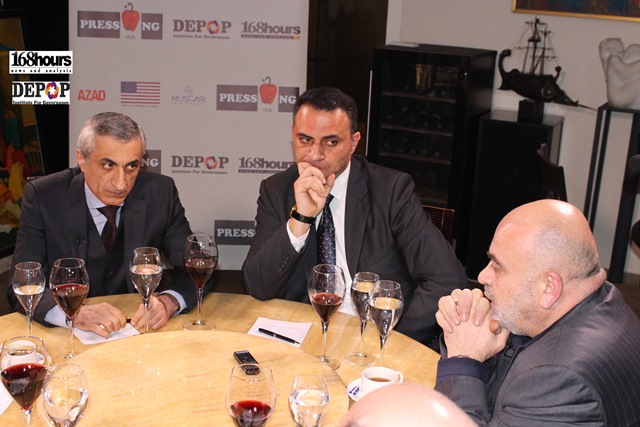
I once said, let me repeat once again, constantly after elections, after every new appointment by pushing the computer button, we intend to restart. How many times can we do it? It just needs formatting, as it means elimination of every deficit—new ideas, new approaches, new thinking. Until a critical mass of people with that new approach, new mentality and creativity (despite they make shoes, or develop a political program) is developed, we’ll constantly face the same issue. After elections with what rhetoric it participated in the political struggle, no matter who’ll come, they’ll have the same issues, and solution to those issues isn’t in approaches of one political power. Unfortunately, there is no perception in Armenia, that winning is the political power, it develops authority, however, after that it should rely on the total package of proposals of the field.
It was correctly stated that the most important circumstance is stability and the issue of its being or not settled in Armenia’s political discourse is stressed in this sense, as, finally, let’s not follow ideological clusters, each small organism, let it be a family, state. Society, has to solve the following issues—security, development. In Armenia these issues are interrelated, one conditions the other, and if we solve security issue, the coming political power should solve that issue. If we imagine that security issues have already been solved, and we bring out that discourse, after it one point emerges—development. What kind of a development? The evolutional development—drop by drop and etc., it isn’t excluded by that logic, that in 2890 by this development temps we may reach to the level on which Scandinavian countries are found.
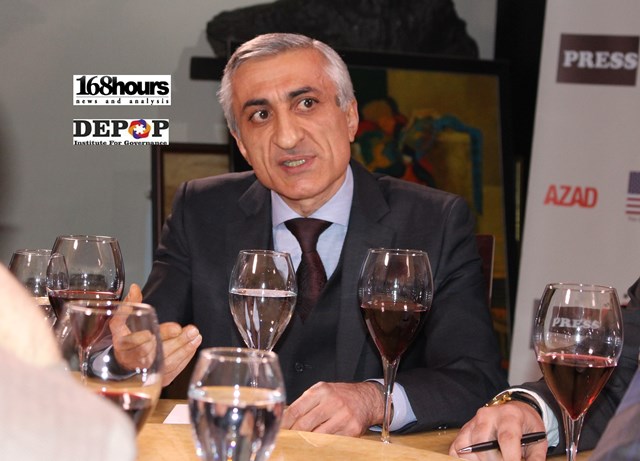
However, it won’t provide anything to us. Armenia’s development phases at least in the history of recent 2000 years have coincided with the period, when agendas discussed in Armenia have been universal agendas. Thus, at the moment around which issue the concept of the world has thought over, the same was thought in Armenia as well, and the solution, which you have found, provided your civilization flight. Today Armenia needs similar debates, the issue shouldn’t be narrowed, localized, think over today’s maximum programs, as the society, which has no imagination, development progress, the idea, value, they all are lost there. Setting forward such issues means facing an important system: if we speak of stability as a pledge for development, stable are the systems, which have variety of external signals to variety of internal signals.
Our society, no matter how socially diversified it may be observed regarding the capacity of thinking, vectors…My partner proposes to clarify, position, I say now any position won’t be correct, just the contrary, you need to eliminate it from yourself, have a variety of your answers, which won’t require mandatory positioning, as it means a skill to make use of political conjuncture of that moment, and as you can’t have an impact on conjuncture, you may be urged to reposition yourself for seven times per year, which will lead the country to destruction. If we speak of stability, its pledge is variety. Our society doesn’t have variety in itself.
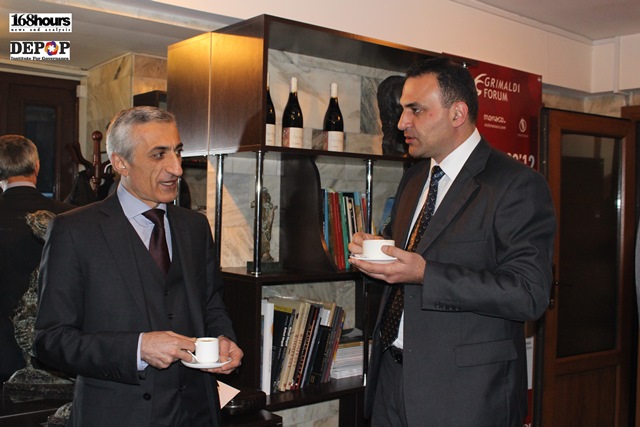
Tigran Hakobyan: It not only doesn’t have, but accepts variety with hostility.
Spartak Seyranyan: In the whole world political elites are fed with ideas of expert elites, moreover, they provoke expert discussions, make clear intuitions on program producers, from which they take those ideas, raise for a degree, give a shape of political program and solve it. Everyone appears in the hole the same way, coming out is an exclusive case. Why do we touch upon Singapore experience? As this is what Singaporeans have found. We, Armenians, should study, but not Singaporean, Korean or German way out, but we can do it only through the Armenian variant.
Aram Mehrabyan: One should have desire to come out.
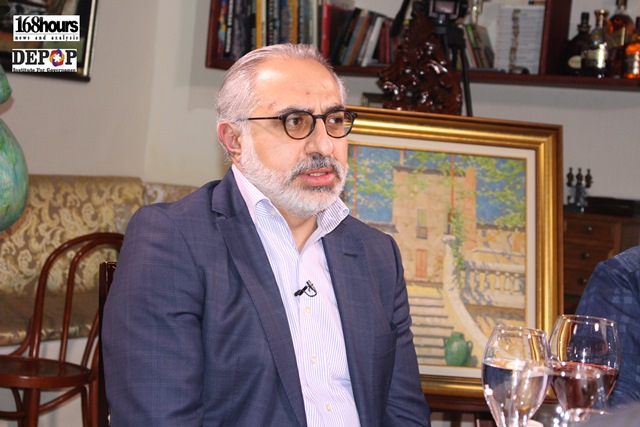
Spartak Seyranyan: I totally agree, but we initially decided that today we both have that desire and that conscience, the world doesn’t prevent us. If we take that ideal variant, this means, your coming out should also be exclusive, you should develop it for yourself to really come out, and we have entire resource for that exclusiveness. I totally agree with Aghasi Tadevosyan—either the spring won’t stand and will break or will swing back with the same intensity in accordance with Newton’s third law. We are a small country, we aren’t large, where imagine you throw a big stone into a big lake and while waves reach to the beach, they calm down. This is a small pool, into which if throwing a stone, the water may pour down, and it may turn down.
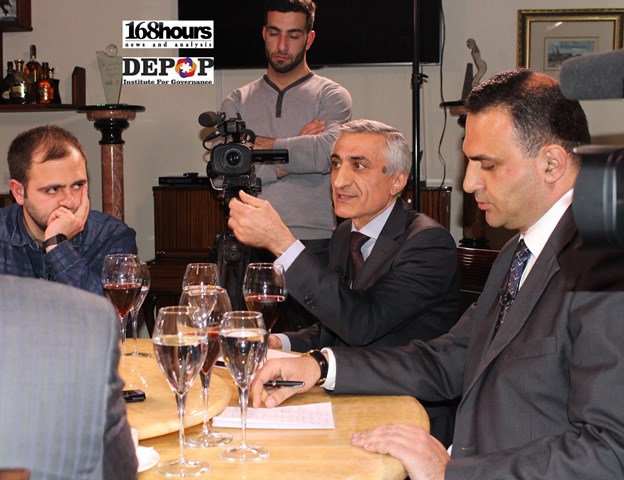
That’s why I don’t support innovative approaches here, I don’t support “either…or” but “both…and”. When you attempt to localize new mentality, but you don’t mandatorily link it with Harvard diploma. When you say a contemporary approach, you don’t mandatorily condition it with the point that a person says seghan [in Armenian—table] and you say—table, moreover, in Oxford accent. Thus, let’s forget formal clichés and people, who can produce concepts despite their political approaches and views, as there may be different political powers in Armenia , have different approaches, I, as a representative of a power, may have different approaches and assessments, but It’s my deep belief that they aren’t less patriots and have their own approaches. Accordingly, one platform should be found despite which political power has won, introduced all possible proposals in dialogues, social and political field and made a progressive development program. As long as this question lacks, despite what kind of a government may come, if methodology of solution to the issue isn’t resolved, questions aren’t properly made, everything will depend on a concrete person. Here Armenian phenomenon will work.
For centuries Armenia was in a global civilization region, which is the point of intersection of civilization, ethno-politics, system of values, where civilization value producing community may benefit. Stages of Armenia’s historical development—Golden Age, Silver Age and etc., were at stages, when state consolidation of this region implemented a civilization function. If Armenia today re-finds its civilization function, it’ll free from that enforcement to mandatorily join any military-political bloc, i.e. you’ll have a role, from which all may make use of, but you’ll benefit the most. Everybody needs this, as no any player there would become the bridge for everyone.
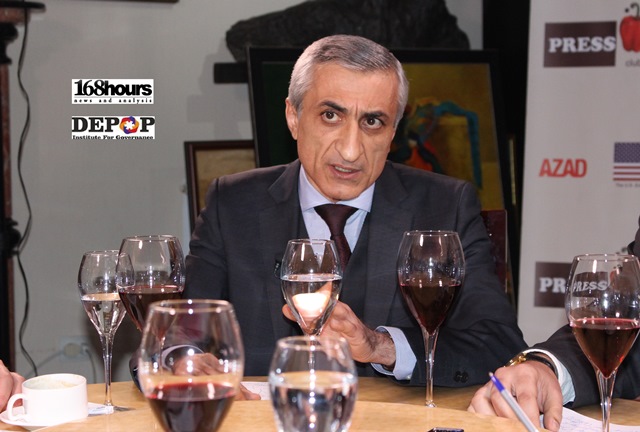
Georgians attempt to assume that role, but they fail not for the reason that they aren’t skillful enough, but it isn’t their function. Any ethno-political environment can’t attribute itself a function, if it isn’t its own. That function in this region has been historically implemented by this state and this people in the region. Currently under Armenia’s situation in the 70s a shoemaker was also a producer of civilization value, as he also was teaching something. Unfortunately, today, not only on the lower level, but on different levels the unknown islets are found, individuals, groups, but there is no any institute implementing a function, as on the one hand, there is no enforcement, and there is no requirement on the other.
Tigran Hakobyan: It’s clear, that this concept should be developed by elites based on people’s imagination, requirements, clichés, history. I imagine something like it, if tomorrow golden fish comes and asks those collective Armenians: What do you want? And those collective Armenians, out of their imaginations, clichés, will set an irrational claim and say: I want return of territories…territories will be returned and we’ll remain tardy, corrupt, with no common vision, a non-competitive state. In this regard the elites are also those that are able to go contrary to people’s imaginations, requirements, wishes, dreams. Maybe in Armenia those elites, which have really been developed or should develop, if not act against people’s imaginations, if they don’t reach any success. What concept should the elite develop, that tomorrow or the day after tomorrow it lead in Armenia—rely on people’s demands or act against people’s requirements and imaginations?
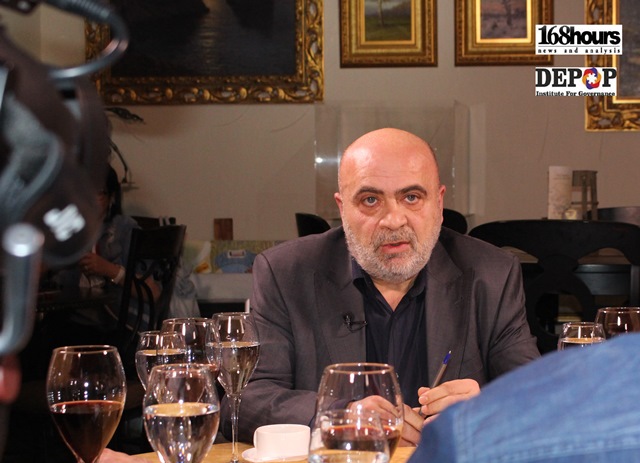
Vahagn Vardanyan: Let me add linked to previous question. You said if it were so that one of the top issues of our nation was Artsakh issue, that it was settled, the issue of the very lands or recognition of the Armenian Genocide may be added to that. If we imagine that way, does it mean that it’s the end of our nation’s history, that our entire history is based on those issues? If we imagine that those issues are solved, are we ready for that? It means whole history vector is changing. Also a question was raised regarding what we want and how we imagine our development vector. At this very moment it’s a pre-election stage: suppositions aren’t an end in itself, that elections are a means. Here a rather strange election fight is ongoing. Mostly it’s said what people want to hear, it’s something like our soap operas, something is being introduced, that masses easily perceive.
If we speak of the point what kind of a development we need to have, do we have ambitions to anticipate that development or to strive to it? We constantly are in comparison—we are the 105th, our neighbor is the 106th, the other is the 107th…Let’s not again idealize another country. Singapore was touched upon. I can say if Singapore is ranked the 6th in some index in the world, it’s isn’t compared to its immediate neighbors, which are the 97th, they compare to themselves previously, comparison is productive, if you are compared to yourself, with your previous indices.
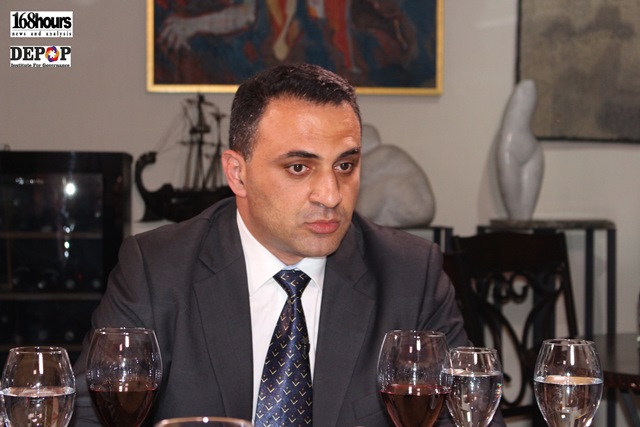
You said we are rather hostile to many things: how can we change intolerance toward anything different, to correctly use the direction, make the shortcoming a privilege? How can those very elites introduce it, as a rather negative change is observed inside the country, people are becoming rather categorical, position on perceiving those differences is becoming more stressed, categorical, hostile, if you don’t support this side, and you consider we have a big geographical position, we don’t understand our location, regarding part of which civilization we comprise. This can also be used as a privilege, as we are a single country in the territory of three continents—European, Middle East and Asian. How properly do we use our geographical position? By that uniqueness we may introduce to the world attempting not to touch another region.
We have a rather big privilege, we use badly or don’t use at all. From the territory of location of our country, a larger territory is called by the name of our nation—Armenian Highland. We don’t use that opportunity, we aren’t able to aptly introduce it. We miss the Armenian Highland from the perspective of our country’s branding and stick to another civilization, which isn’t ours. My main question will be as follows: as continuation of your question to which degree are we ready or what degree ambition do we have to develop our country? We also forget that we are a universal nation. It’s only peculiar to two nations—we and Jews. As compared to them, we aren’t capable of fully involving the Diaspora to contribute to the growth of our investments, to the growth of the number of population.
Tigran Hakobyan: You mentioned a very good point. Which nation has those ambitions? I consider it doesn’t, as a nation can’t have ambitions considerable percentage of which isn’t against joining another nation, a nation can’t have ambitions, which has such migration temps, i.e. different indices are introduced, that the Armenian nation doesn’t have ambitions. Israel never calls itself a universal nation, however, it has reached greatest success, and from 1991 that thesis was circulated in our country as well, which gives us nothing. To which extent the elites should independently develop their ambitions and urge the nation, as the next government should be developed from those very elites. Let me cite, recently I read, that in Japan education year starts on April 1, as Sakura blossoms and the first class is that of culture, kindness, recognizing the country and loving it. An elite should be developed, that will urge this average society the ambitions, which the nation doesn’t currently have.
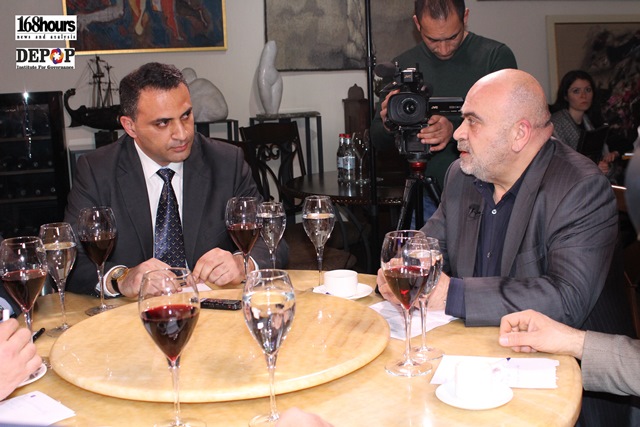
Spartak Seyranyan: Out of unknown reasons we consider that there will be no manifestation of patriotism, or we’d slightly damage patriotism, if we say the following statement: people neither create the alphabet, nor a psalm, nor khachkar, nor a vision, nor ideology, nor independence. This all is created by elites. The elite succeed either to convince or urge people. I wish our elites, which will develop, will succeed to convince, but if there is no other way out, those elites should urge the concepts, vision, as success is recorded in countries, where elites urge sometimes even by most repressive, harshest methods.
Aram Mehrabyan: If we somewhat allegorically look to the elite, if we look to the state by the principle of anthropomorphism, it’s clear what assumes in human body the part of dreaming, creating orders. Dare to think that hand or foot may set the issue of self-recognition, is difficult. It isn’t yet clear to us—is our history anthropoid or not, or which organs took them as the head, and this mess yet needs clarifications. The issue of intolerance, that Vahagn has raised, I consider, has more connection to fear, especially, linked to the fear for the future. In case, when even the past is created to become a basis for the future, we have a fear, as we perceive the past with many clichés and make it a tombstone, we close the door, which leads us to self-recognition, we don’t make an attempt for self-recognition, we live by clichés, standard opinions.
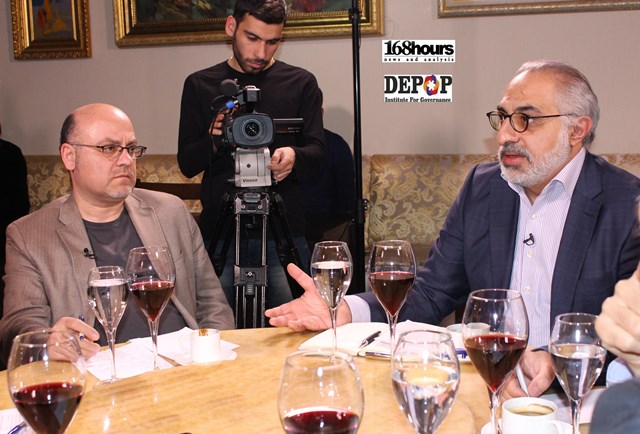
Dare to recognize this, maybe is the issue of not only of Armenians, but generally, of an individual. The same refers to the state—what do we want? This is the most crucial issue, even today’s political mess won’t convince me in this issue—what do you want, don’t my and your intentions intersect at one point or not? As currently process of two parallel worlds is taking place—political and civilizational or cultural, cycles of which are different. The political one may be once in 4-5 years, civilization cycles are much longer, and other qualitative features are required there, so that one can imagine 50 years, 100 years, 150 years, 200 years, and it depends on your today’s activity, what we’ll have in 100 years, 1000 years, 5000 years, and we shouldn’t be afraid of thinking over such deadlines.
The more short-term you set the issues, the more difficult it’s to solve them, as a man can never walk, if he/she watches his/her steps all the time, i.e. our political, cultural nearsightedness is one of the biggest obstacles, and to develop a long-term sight deep cultural processes are necessary. That’s why you often close the door of political discourse, as you have nothing to do there. You don’t’ want to waste your energy, resources in all this. 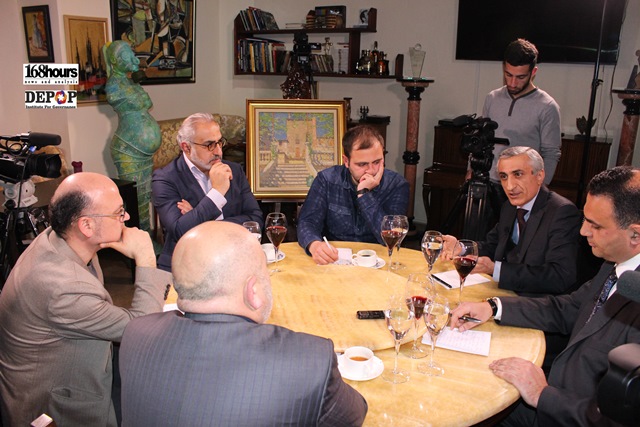
Tigran Hakobyan: But if you don’t waste, you don’t feed those political elites, which, finally, should make decisions.
Aram Mehrabyan: I agree, but this development attempt should stem from cultural platform, should feed the political field. Of course, my question also refers to Aghasi, what shape the so-called “top-bottom” has, or it’s like a sand watch—they constantly rotate, where are that top and bottom? I agree with Spartak, that it’s historical fortune to appear in this territory, have a state and look to the issue with that realization. We sometimes speak with rather collective notions—church, state, but the issue of a concrete person exists—am I better for myself compared with yesterday or not, did I become wiser, did I start perceive the beautiful better?
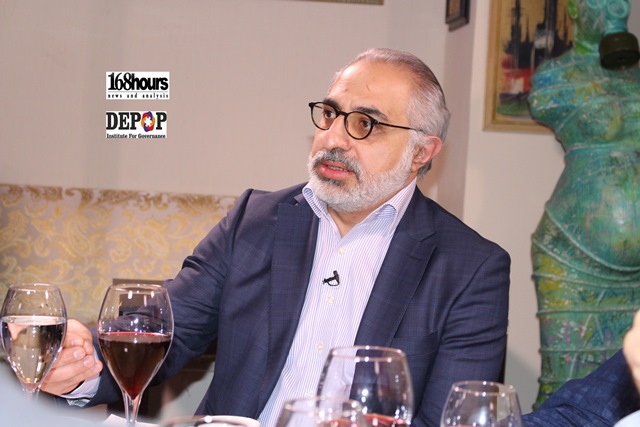
If this issue isn’t set on individual level, it means, I have closed the door to comprehend what really goes on around. I recently avoid generally describing some phenomenon with collective notions, as we deal with rather concrete people. As Aghasi said, by those small groups they’ll come to common points, around which they’ll have convictions, that time that process of crystallization will start to generalize, and here it’s very important, that we’ll succeed to record that metabolism quicker, and that dialogue will be launched.
Tigran Hakobyan: Mr. Margaryan, will you try to give political packing to all these cultural, philosophical, humanitarian messages?
Levon Margaryan: In debates linked to the Islamic State some tendencies were observed in Christian civilization. In fact, we are the only Christian state, however, in this issue we also attempted not to have any role with the principle of staying inoffensive. When I say position, I don’t mean whether we go to the EU, EEU, I mean these very positions—will we position ourselves or not? Until now we haven’t. In this sense we again saw inactivity of our elite. I want to reflect to the next question you gave linked to desires. Here we fall into the story of the hen and the egg, as how are dreams of those people developed? They don’t develop at once, some political power is coming, feeds with expectancies, and dreams remain.
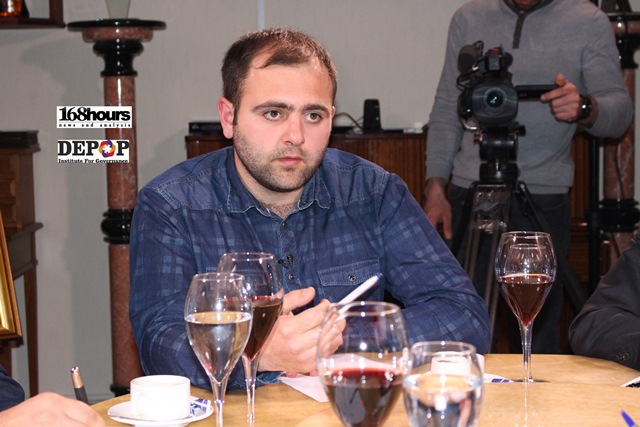
Tigran Hakobyan: Dozens of political powers have changed, I mean also in the period of Soviet leadership, but the issue of those lands, the vision of “from sea to sea Armenia” doesn’t die, it lives, i.e. it’s so deep, that has nothing to do with current political elites. My fear is this that base requirement dictates the elites to demand from the golden fish what Armenia presently doesn’t really need.
Levon Margaryan: Lack of accountability has a positive effect, that sometimes elites, by being jobless frequently are more rational and pragmatic in real policy, than the society. Coming to the point how emptiness in people-elite should be filled, as Mr. Seyranyan said, the elite either should convince or urge. We see that they don’t even attempt to convince. We see in Armenia that our elite neither convinces nor urges, but by using, abusing weaknesses of the society simply attempts to use for solving issues of certain interest, even not considering that in future it may be used against itself.
During the July developments we see that anti-leadership discourse is full of rather radical nationalists texts. Formerly we had various anti-leadership manifestations—both political and civil, however, nationalist discourse wasn’t so much in them. Even the authorities have been often accused of being nationalist. This time accusations are full of sharp radical nationalist content. Why was it so? As the authorities very often used propaganda tricks by internal, social issues through pathos, patriotism, education, media, it attempted to cover up the issue at that moment, however, it already became a discourse, mentality, and we saw how in July it was turned against themselves.
Spartak Seyranyan: The developments in July were a nicely shaped project and had to do neither with social perception, nor the authorities and its numerous sins. It was a nicely planned project, figuratively said with the methodology of “selling Coca-Cola”.
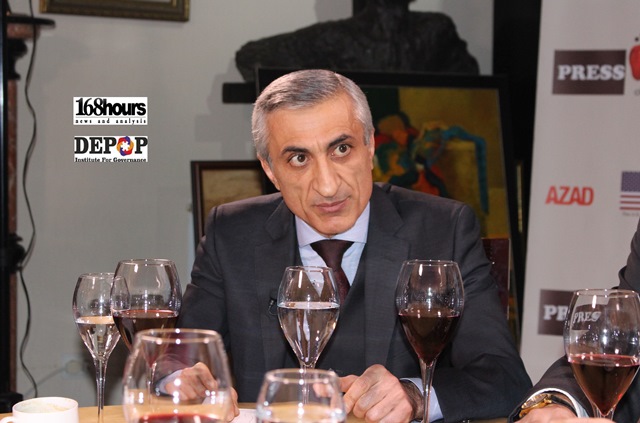
Levon Margaryan: I don’t speak of the very reality, but the discourse, despite everything, it existed, it was born from the air, i.e. it was fed and its main resources were in hands of the authorities. In this regards I consider our elites aren’t yet ready to perceive these meanings, they solve momentary issues. When I touch upon Karabakh conflict, I don’t only mean Azerbaijan-Armenia relations, moreover, in my opinion, Karabakh conflict is more Armenia-Russia relations issue. Currently we are really under Russia’s very heavy pressure, that pressure has changed its essence and throughout recent years linked to civilization changes ongoing in Russia, and we can’t take a breath, we attempt to do something, we feel that pressure. In this sense our elite very often technically had no time and opportunity to look further, as it constantly faces an issue of solving present-moment points.
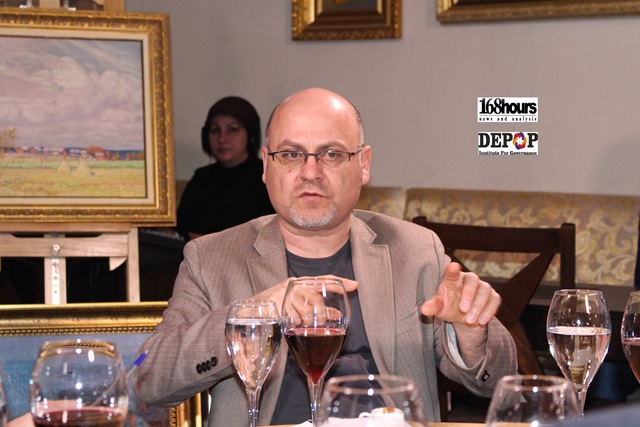
Aghasi Tadevosyan: Let me make an important accentuation. I touched upon the elite and noticed, that during the debate we started to separate the elite from the society, meanwhile, I didn’t mean it. One of the most important issues is how that elite is being developed, and the biggest issue of our society are issues of mechanisms for the elite development. According to Levon they appear under the pressure of different external powers: it comes from the very point that we have an issue to develop our elite. The elite isn’t differentiated from the society, I consider the elite is scattered among the society, dissolved among the society, it’s the creative resource of the society.
The most effective mechanism of elite development is when the society inserts filters, assisting its creative potential to consolidate and obtain a functional role in the society. In that case any external power has no any opportunity to exert pressure over that elite, as it’s constantly scattered. Why is it easy to currently oppress our elite, as it’s a very close elite and sits in a concrete place, it’s possible to personalize, call and exert pressure. And if it’s scattered among the society, the elite in that very building exerts pressure over them. On September 3 people complained before Baghramyan 26 regarding why Serzh Sargsyan has willfully signed a document that Armenia entered EEU, who gave that liability to them, it was his personal decision, but there are people thinking differently, and those people are those very scattered elites.
One of the biggest issues in our society is that who has administrative leverage of governance at the moment and possessed those leverages, it uses the mechanism of anti-filters for elite development, and we see how those elites are being developed—district criminals, criminalized people, who have closed that creative resource of the society to flow from top to bottom and to constantly change. The elite is the one capable of flowing from top to bottom and always changes.
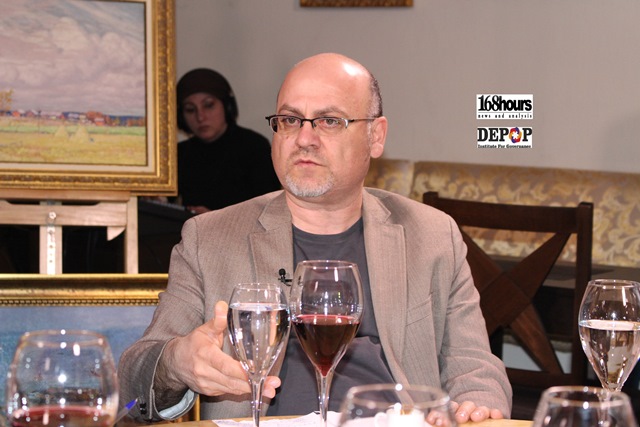
The other issue we touched upon a while ago is already linked to the world, regarding how we describe ourselves. We say we aren’t a good nation, we are a dirty nation—these are self-description manifestations. Who does it do? From where does it flow to the bottom and spread? Who are interested parties, who are they? I consider they are current monopolists, the wealthy, who don’t even understand that today they assume that role, as they see their security maintenance of their wealth in other country—under Russia’s patronage, they don’t see it in us and those authority discourses are scattered among the lowest society layers. Armenia’s interest isn’t staying under Russian umbrella, maybe as a partner you can regard Russia as well. You shouldn’t be able to orientate correctly, whether today Russia is an investment field or not. If it isn’t an investment field, then it’s a colonial center for you. If you don’t see a possibility for investments, you should be cautious then. These imaginations about yourself, the world and about your place in the world are developed by those elites, which simply are people living among us.
Tigran Hakobyan: Imagine, you’ll head the government from April 3—introduce shortly what will you start with? Imagine, you are the PM, who should make the first decision.
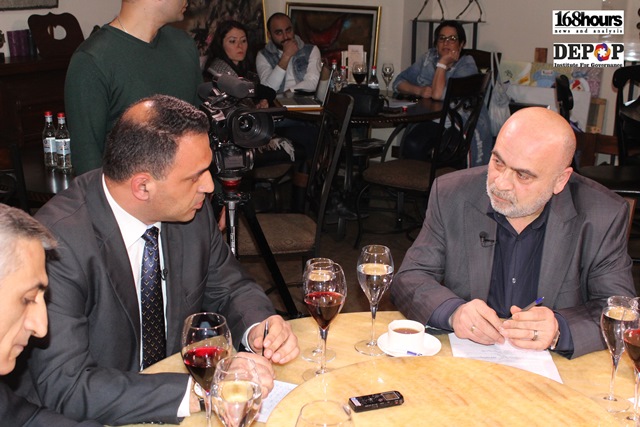
Spartak Seyranyan: If not to use a pompous word, it doesn’t matter from where you’ll start your first step, the most important is establishment of justice-internal, justice, inner-society, as no matter what idea you nominate, if there is no justice element you can’t convince anything, only justice is convincing.
Tigran Hakobyan: Is elimination of deficit by one government decree possible?
Spartak Seyranyan: No, it’s impossible, as for every field you should find justice formula, if we, e.g. set a purpose for the field of education, that people had some storage of knowledge, then it’s more correct to set rise of human capital before the educational system.
Levon Margaryan: If I became the PM, naturally, I’d become due to growth of influence of some clan powers, and naturally, one of the first steps was to understand which clans I’ll oppress, and how I’ll develop by clan interests. I consider currently it’s impossible to imagine about it, as we have a situation, which doesn’t’ differ, and change of the PM is that very situation, we have varying curious situations, the political elite doesn’t agree something in itself, the PM become the buffer, in relations of in one case domestic policy, in the other—in foreign policy, and by that buffer we attempt to clarify certain relations between some clans, that’s why it would depend whether I’d become the PM by clan, and would accordingly decide how to position myself, but this isn’t the best scenario.
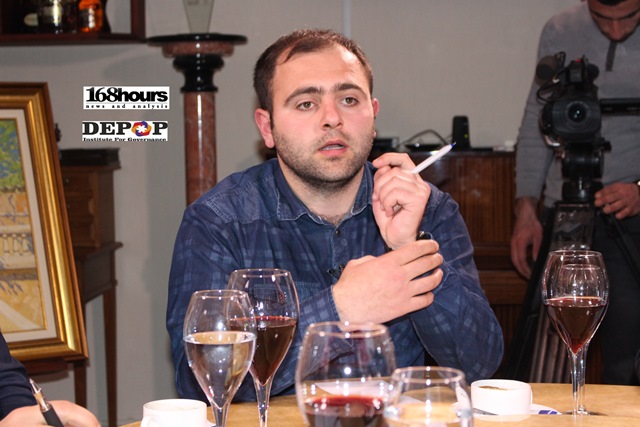
Tigran Hakobyan: Consider, there are no clans, and you are free in your decisions.
Levon Margaryan: I’d attempt to gather people, who are specialists in humanitarian field, who imagine the field and enter a stage of surveys on a long-term perspective, so that all these issues, on which we generally spoke, were perceived in a more detailed manner.
Aram Mehrabyan: As my imaginations or the approach on a developed state is always linked to the truth, that how much demand the society has for internal truth, as the PM I’d involve people so that those elites at least penetrated into the space, where the doors have been closed for 25 years and more for people with that quality, who’ll come and change with their imagination and world, and by the principle of anthropomorphisms, we, as a state, will have the sane organism, which will pass on to creative self-creative process.
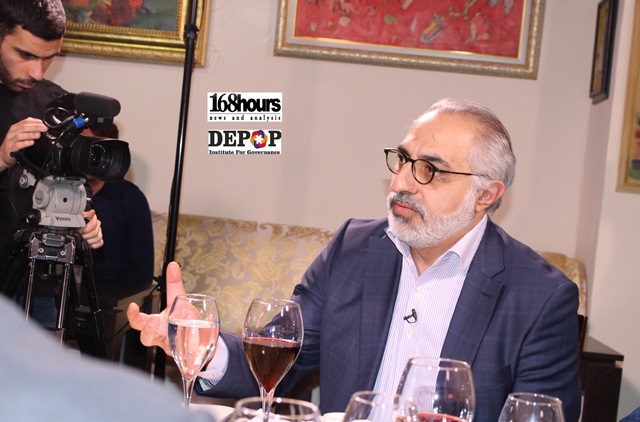
Aghasi Tadevosyan: Firstly, I’d establish an administration in fight against corruption, in which I’d involve people from various fields. I’d establish it in a way that it was ideally participatory and perfectly transparent. It would be an administration of revenge, privatization, depriving of property, as I understand that capital accumulation has passed a long way and now going back and then forth, means destabilizing the country. Thus, from this very point you prevent all corruption operations in the country. Secondly, I’d implement radical reform of educational system by providing largest GDP allotments to the field of education and science. Thirdly, I’d centralize the humanitarian mind, as it should feed those two crucial issues.
Vahagn Vardanyan: I consider development not only economic, but also a psychological phenomenon and I think there is an issue of serious mentality in our society. First, I’d like to move forward the idea that it isn’t bad learning from the other’s experience, clearly distinguish pride from complacency.
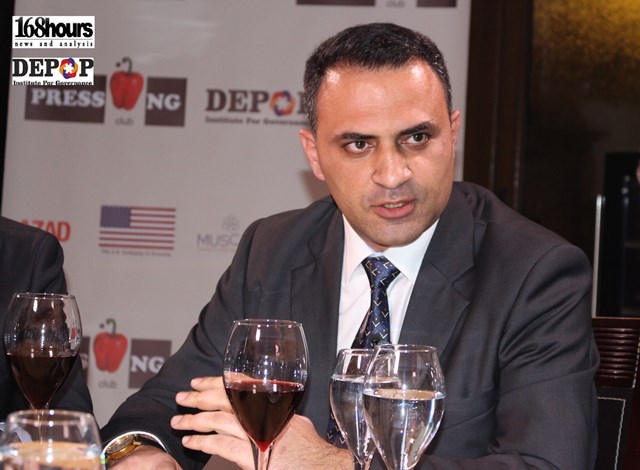
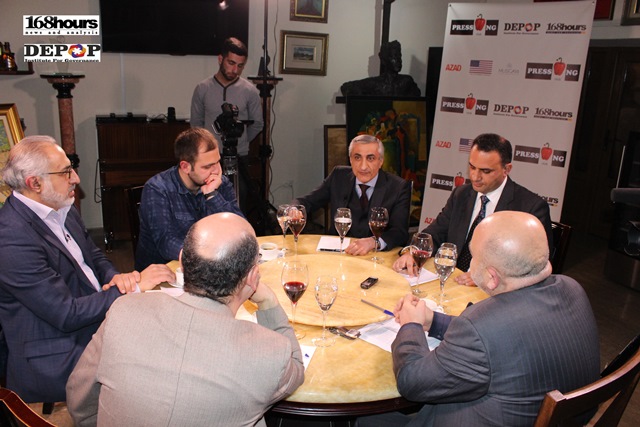
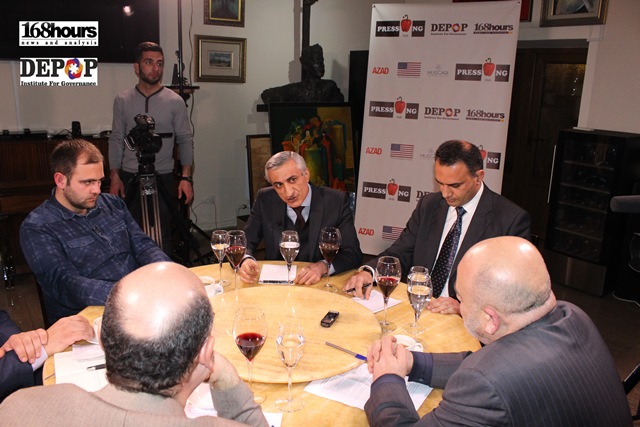 As in most cases we attempt to introduce ourselves as proud, but there are cases, when it’s simply complacency. Regarding fight against corruption one should be radical. I’d attempt to introduce it from elementary, school level, start working with children, as it’ll be more productive, I’d attempt to develop the concept if there is no social support, only school, the government can’t fight, both should do together—the house and the state.
As in most cases we attempt to introduce ourselves as proud, but there are cases, when it’s simply complacency. Regarding fight against corruption one should be radical. I’d attempt to introduce it from elementary, school level, start working with children, as it’ll be more productive, I’d attempt to develop the concept if there is no social support, only school, the government can’t fight, both should do together—the house and the state.
Ani Keshishyan
Razmik Martirosyan
Photos—“168 Hours”
“Pressing” Club is implemented in partnership with “DEPOP” Institute for Governance and “Azad Pharma AG” Swiss Company









